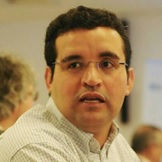Bio
Jamal Bahmad is an assistant professor in the Department of English Language and Literature at Mohammed V University, Rabat, Morocco. He earned his PhD from the University of Stirling, United Kingdom, with a dissertation on Moroccan urban cinema since 1990s. He has held a British Academy postdoctoral fellowship at the University of Leeds and, prior to that, was a research fellow at Philipps-Universität Marburg, Germany. Dr. Bahmad specializes and has published widely in the field of North African cultural studies with a focus on cinema, cities, literature, memory, and youth cultures. He is currently working on his first monograph on Moroccan urban cinema since the 1990s and a co-edited special issue of French Cultural Studies (SAGE Journals, 2017) on trash cultures in the Francophone world.

